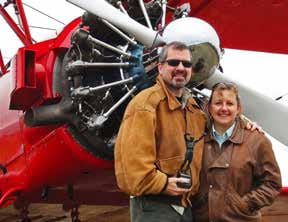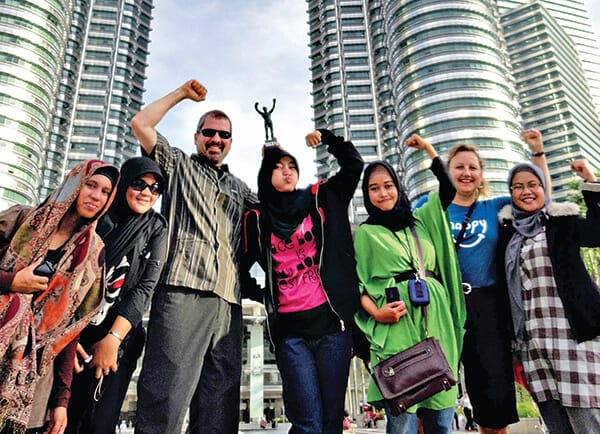By Michael Milne
In August 2011, my wife, Larissa, and I chucked it all to travel around the world for a year. We were reconsidering the next phase of our lives and hoped the trip would serve as a vehicle for that thought process. One of our goals was to meet locals who could share unique insights into their cultures—information not available in a guidebook. Fortunately, the extensive Wharton alumni network offered us an opportunity to make such contacts. Before arriving in a new destination, we reached out to the local Wharton club and asked to meet some of their members. Many were eager to welcome us to their city.

Philadelphia natives Michael and Larissa Milne, and trip mascot Little Rocky, about to board a biplane in New Zealand
Here’s a global sampling of alumni we met:
Dubai: Investment banker Fatima Faheemi, WG’10, hosted us for lunch at a restaurant overlooking the turquoise waters of the Persian Gulf. We were excited to meet a native Emirati, a rare occurrence in the UAE, where more than 90 percent of the population is made up of foreign workers and their families. Following the custom of hijab, the Islamic dress code for women, Fatima was clad in the traditional black abaya (adorned by fashionable purple accents) with only her face exposed below a silky head scarf. Our misconception was that a Wharton MBA would be dressed in more modern attire. But to her, it’s just a uniform, no different from a businessman wearing a suit and tie. This seemed refreshingly matter-of-fact compared with the controversies raging across Europe over women wearing traditional Muslim clothing.
Kuala Lumpur: We met hotel executive Donald Lim, W’86, ENG’86, at one of his properties in Kuala Lumpur. As a sign of the burgeoning growth in Asia, the 20-year-old hotel was about to be demolished so that a bigger one could be built in its place. Donald was intrigued that we had visited North Korea (the only locale where we didn’t find Wharton connections, but at the current rapid pace of change in the world, perhaps it’s only a matter of time). Donald revealed that a few years earlier a mysterious group wearing Kim Il-Sung badges approached his company to invest in the completion of a hotel in Pyongyang. At 105 stories, the Ryugyong Hotel would be the tallest hotel in the world if finished, but work on it stopped more than 20 years ago. The visitors hinted that North Korea would eventually open up to outsiders and that his investors could get in on the ground floor, so to speak.
Sydney: Seemingly impervious to the global slowdown, the Australian economy was flourishing when we visited, mostly due to a mining boom exploiting the country’s vast mineral resources. While the country was partying like it was pre-Great Recession 2006, we caught up with a former classmate and management consultant, Larry Cornell, WG’86, who saw things differently. He invited us over to his house to watch Australia compete in a World Cup rugby match. Over pints of Toohey’s lager, we discussed the Australian economy. According to Larry, “Mining goes in boom and bust cycles, and this one won’t last forever. It never does. It’s feeding off demand from China and India, a need that is slowing down and will lead to another bust cycle.” Larry’s foresight is proving to be correct.
Ho Chi Minh City: The city was just waking up from its Tet holiday-induced slumber when we saw Barry Weisblatt, WG’96, at the rooftop bar of the Rex Hotel. Our nighttime view took in the signs of rampant capitalism—flashing neon, skyscrapers with helipads, and the sound and fury of millions of mopeds roaring through the city streets—all hard to imagine in Ho Chi Minh’s day. Barry’s career led him to Asia, where he put his entrepreneurial skills to use in Vietnam, one of the world’s strongest growth markets. Starting with one small shop, he now owns a chain of women’s clothing stores. According to Barry, “Vietnam has become a new land of opportunity. I love it here.”
We also made contact with fellow alumni in Beijing, Paris and London. Many of the folks we met had returned to their native countries after graduation, but there were also a few, such as Barry in Ho Chi Minh City, who are transplanted Americans. They moved away from everything they knew and are now flourishing. That got us thinking about breaking out of our own comfort zone. Could we just up and move to Vietnam? Or Malaysia? Or Dubai? Could we live in these places and thrive?
Often, it is the disruption of normal routine that broadens one’s horizons. By leaving our home city of Philadelphia, we met and reconnected with more Wharton alumni than if we had stayed put. Social networking and electronic communications have their place, but a voice on the phone or a “Like” on Facebook cannot replace the visceral connection of getting out into the world and meeting people face to face. Humans are social animals; we need to look each other in the eye and create the physical bond that truly establishes a relationship. On this journey I was able to do so and witnessed the robust global reach and lifelong connections of Wharton. Perhaps on our next worldwide odyssey, we’ll even meet a fellow alumnus in Pyongyang.
Michael Milne, WG’86, spent 25 years in commercial real estate before embarking on his year-long trip around the world with a Rocky statue. He and his wife Larissa are blogging about their adventure at www.changesinlongitude.com and writing a book about chucking it all in midlife.

























